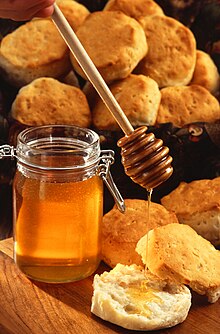Scone: Difference between revisions
Rex Germanus (talk | contribs) flemish is not a language Warmelink. As a Dutchman you should know that. |
Undid revision 172940822 by Rex Germanus. Flemish at least was a language, ABN is a creole of Brabantic, Flemish and (West-)Frisian |
||
| Line 4: | Line 4: | ||
The '''scone''' is a [[United Kingdom|British]] snack of [[Scotland|Scottish]] origin. A small quickbread made of [[wheat]], [[barley]] or [[oatmeal]], usually with [[baking powder]] as a [[leavening agent]]. British scones are often lightly sweetened, but may also be savoury. In the U.S., scones are drier and larger, and typically sweet. |
The '''scone''' is a [[United Kingdom|British]] snack of [[Scotland|Scottish]] origin. A small quickbread made of [[wheat]], [[barley]] or [[oatmeal]], usually with [[baking powder]] as a [[leavening agent]]. British scones are often lightly sweetened, but may also be savoury. In the U.S., scones are drier and larger, and typically sweet. |
||
The pronunciation across the [[United Kingdom]] is varied. Some sections of the population (nearly two thirds of the British population and 99% of the Scottish population, according to one academic study<ref>Wells, J.C. "[http://www.phon.ucl.ac.uk/home/wells/survey-report-icphs.pdf Pronunciation Preferences in British English: A New Survey]". University College London, 1998</ref>) pronounce it as {{IPA|/skɒn/}} (to rhyme with gone, the [[U_and_non-U_English|U English]] Pronunciation), and the rest pronounce it {{IPA|/skəʊn/}} (to rhyme with cone, the [[U_and_non-U_English|Non-U English]] pronunciation). According to Merriam-Webster, the word scone derives perhaps from the [[Dutch language|Dutch]] ''schoonbrood'' (fine white bread), from ''schoon'' (pure, clean) and ''brood'' (bread). Making way to the [[English language]] via [[Scots Language|Scots]]. |
The pronunciation across the [[United Kingdom]] is varied. Some sections of the population (nearly two thirds of the British population and 99% of the Scottish population, according to one academic study<ref>Wells, J.C. "[http://www.phon.ucl.ac.uk/home/wells/survey-report-icphs.pdf Pronunciation Preferences in British English: A New Survey]". University College London, 1998</ref>) pronounce it as {{IPA|/skɒn/}} (to rhyme with gone, the [[U_and_non-U_English|U English]] Pronunciation), and the rest pronounce it {{IPA|/skəʊn/}} (to rhyme with cone, the [[U_and_non-U_English|Non-U English]] pronunciation). According to Merriam-Webster, the word scone derives perhaps from the [[Dutch language|Dutch]] ''schoonbrood'' (fine white bread), from ''schoon'' (pure, clean) and ''brood'' (bread). Making way to the [[English language]] via [[Scots Language|Scots]] itself via [[Flemish Language|Flemish]]. |
||
==Description== |
==Description== |
||
| Line 14: | Line 14: | ||
[[Image:Scone varieties.jpg|thumb|left|Clockwise from bottom: Hot buttered tattie scones next to a cheese scone, shiny and flat treacle scones, and a milk scone above a fruit scone.]] |
[[Image:Scone varieties.jpg|thumb|left|Clockwise from bottom: Hot buttered tattie scones next to a cheese scone, shiny and flat treacle scones, and a milk scone above a fruit scone.]] |
||
In [[Scotland]] and [[Ulster]], savoury varieties of scone include ''soda scones'', also known as soda [[farl]]s, and [[Tattie Scone|potato scones]], normally known as tattie scones, which resemble small, thin savoury [[pancake]]s made with potato flour and resemble the Jewish [[latke]]. Potato scones are most commonly served fried in a [[Breakfast#The_British_Isles|full Scottish breakfast]] or an [[Ulster fry]]. |
In [[Scotland]] and [[Ulster]], savoury varieties of scone include ''soda scones'', also known as soda [[farl]]s, and [[Tattie Scone|potato scones]], normally known as tattie scones, which resemble small, thin savoury [[pancake]]s made with potato flour and resemble the Jewish [[latke]]. Potato scones are most commonly served fried in a [[Breakfast#The_British_Isles|full Scottish breakfast]] or an [[Ulster fry]]. |
||
==See also== |
==See also== |
||
| Line 26: | Line 22: | ||
==References== |
==References== |
||
<references/> |
<references/> |
||
[[Category:British breads]] |
[[Category:British breads]] |
||
Revision as of 05:56, 22 November 2007


The scone is a British snack of Scottish origin. A small quickbread made of wheat, barley or oatmeal, usually with baking powder as a leavening agent. British scones are often lightly sweetened, but may also be savoury. In the U.S., scones are drier and larger, and typically sweet.
The pronunciation across the United Kingdom is varied. Some sections of the population (nearly two thirds of the British population and 99% of the Scottish population, according to one academic study[1]) pronounce it as /skɒn/ (to rhyme with gone, the U English Pronunciation), and the rest pronounce it /skəʊn/ (to rhyme with cone, the Non-U English pronunciation). According to Merriam-Webster, the word scone derives perhaps from the Dutch schoonbrood (fine white bread), from schoon (pure, clean) and brood (bread). Making way to the English language via Scots itself via Flemish.
Description
British scones closely resembles a North American biscuit (many recipes are, in fact, identical) — itself not to be confused with the English biscuit, which equates to the American cookie. In the United States, there is a growing tendency to refer to sweet variations as "scones" (perhaps under influence from espresso bars, where they are popular fare), while those eaten as part of savoury meals are known as "biscuits". American "scones" are often baked to a dry and somewhat crumbly texture, and are typically large and rectangular; more like a cross between a cookie and a muffin than a biscuit. In Canada, both tend to be called "biscuits" or "tea biscuits".
Varieties
British scones frequently include raisins, currants, cheese or dates. In the United States, scones sold by coffee shops often include fillings such as cranberries, blueberries, nuts, or even chocolate chips. More original fillings include smarties. However, most fillings tend to be spices, including cinnamon and poppy. In both Britain and the U.S., mass-produced scones tend to be doughier than home-made scones.

In Scotland and Ulster, savoury varieties of scone include soda scones, also known as soda farls, and potato scones, normally known as tattie scones, which resemble small, thin savoury pancakes made with potato flour and resemble the Jewish latke. Potato scones are most commonly served fried in a full Scottish breakfast or an Ulster fry.
See also
References
- ^ Wells, J.C. "Pronunciation Preferences in British English: A New Survey". University College London, 1998
